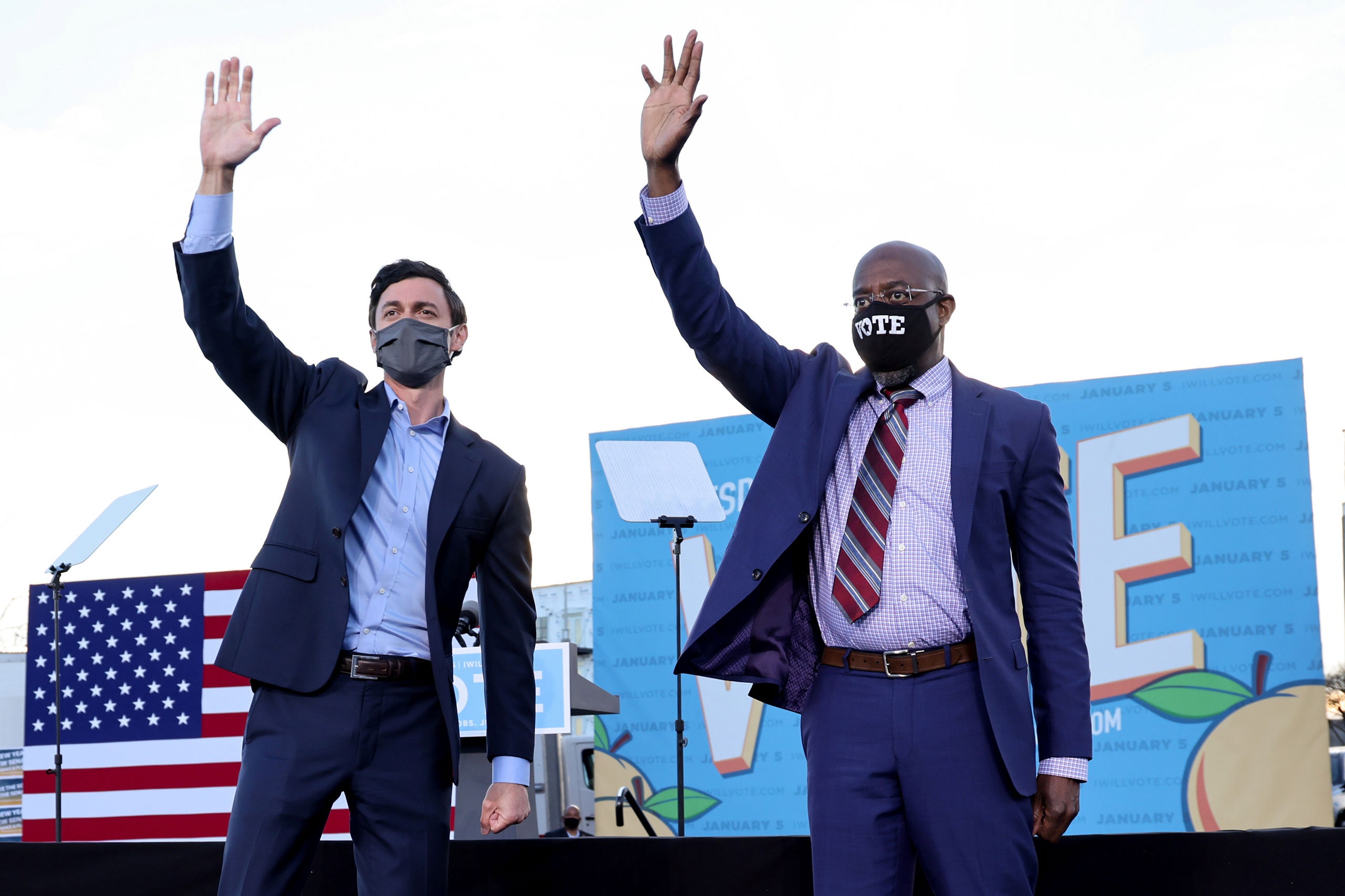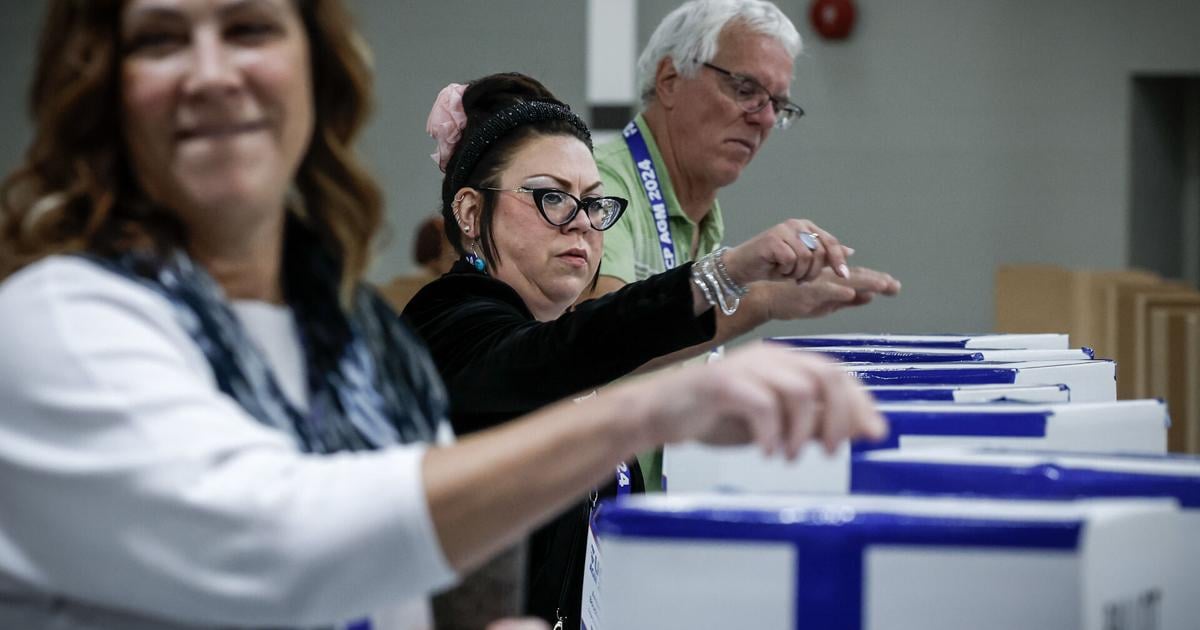Click Senate Special Runoff below to see results from the race between Kelly Loeffler and Raphael Warnock, or General Election Runoff for results from the race between David Perdue and Jon Ossoff.
The pandemic makes all celebrations hushed and a little strange, including political-victory speeches. A little after 12:30 A.M. on Wednesday, the Reverend Raphael Warnock, the pastor of the Ebenezer Baptist Church and presumptive senator from Georgia, flickered onto a live stream, sitting alone in a small office. Over his left shoulder was a cross; over his right shoulder was a copy of Barack Obama’s “The Audacity of Hope.” Jon Ossoff, the other Democrat in Georgia’s twin runoffs for the Senate, appeared likely to unseat Senator David Perdue, but on Wednesday morning the race remained too close to call. If both Democrats win, they will give the Party, improbably, control of the U.S. Senate in January and President-elect Joe Biden a much better shot at passing meaningful legislation.
Warnock was reading from a prepared speech, at times a little jerkily, but he had a conversational tone and an easy grin. He barely mentioned the stakes of this election for Democratic policy goals, focussing instead on his own biography. Warnock is the eleventh of twelve children, was raised in a Savannah housing project, and now is the pastor of the church in Atlanta where Martin Luther King, Jr., served as pastor and John Lewis prayed. Warnock spoke of his mother. “The other day, because this is America, the eighty-two-year-old hands that used to pick somebody else’s cotton went to the polls and picked her youngest son to be a United States senator.”
All kinds of historical loops were closing in Georgia on Tuesday night. There were long ones, like those that Warnock mentioned. He will be only the eleventh Black senator in American history, and the first Black Democrat to be elected to the Senate from the South. His victory, and Ossoff’s apparent one, was powered by very high turnout among African-American voters and comparatively low turnout among the rural white voters on whom the Republicans have increasingly come to rely. But there were shorter loops, too. Almost exactly six years ago, Mitch McConnell became the Majority Leader of the Senate, and, ever since, politics in Washington have been in what was starting to seem like a permanent state of stagnation. McConnell operated as a hand brake on Washington, and Washington as a hand brake on the country, until it was hard to separate the political condition from the national one. Problems festered. Scant legislation passed. Nothing ever seemed to change. Republicans fought eternally to manage their own extremists, never successfully, while deepening their institutional control, of the judiciary most of all. The progressive certainty that the arc of history was bending only strengthened, but Democrats continued narrowly losing all of the most important votes. Everything kept coming down to a coin flip, but the coin always flipped the same way.
The story has been similar in Georgia. Before this week, there had been eight statewide runoffs since 1992, and Republicans had won all eight. The Atlanta region kept growing, and becoming more progressive, but the state never quite turned. Even as Biden beat Donald Trump by eleven thousand seven hundred and seventy-nine votes in the state on November 3rd, there were heartening signs for McConnell: in both Senate races, the Republicans got more votes than the Democrats (though neither Perdue nor Loeffler reached the majority that would have averted Tuesday’s runoff). What happened between November 3rd and January 5th?
Just about everything. President Trump relentlessly, but ineffectively, tried to bully Republican state officials into finding some grounds to overturn Georgia’s results in the Presidential election, and some of his supporters issued death threats against those state Republican officials. Both Perdue and Loeffler were investigated for insider trading: they had sold off millions of dollars in stock after having received early briefings about the likely extent of the coronavirus pandemic. Loeffler’s campaign was accused of artificially darkening Warnock’s skin in some of the ads it ran. The very same tactics and compromises that have defined McConnell’s Republican Party—the cynical relationship with Trump, the comfort with defending the prerogatives of the rich, the weaponization of race—all backfired in Georgia. The margins were narrow again, but the conditions were different. This time, the coin flipped the other way.
If the Senate elections in Georgia constituted the first political event after Biden’s election, then they still seemed to belong very much to the Trump era: the lame-duck President’s efforts to overturn his own loss dominated the news throughout the runoff campaigns. Despite having so much at stake in the runoffs, Biden himself was a curiously intermittent presence in Georgia. He did arrive in Atlanta on Monday to hold an outdoor rally, where he sounded upbeat, promised healing, and seemed to belong to an entirely different time in American life than the one playing on the cable networks, in which Republican senators were promising to contest the certification of the election on Wednesday, despite having no evidence of fraud, and extremists were gathering in Washington for a pro-Trump rally. As votes were being counted in Georgia, some of those protesters were filmed fighting in D.C. with a line of riot police. Biden’s light presence was just as well; it let the focus drift elsewhere, to the long effort of activists to organize the progressive vote in Georgia. “The 10-year Stacey Abrams project to flip Georgia has nearly come to fruition,” ran a headline in the Times, just after midnight. At about 1:30 A.M. (with both races still uncalled, and Atlanta’s vote belatedly coming in) Ossoff took a very narrow lead over Perdue. Warnock’s race was called around 2 A.M. The hand brakes were off. The McConnell era seemed to be ending. Twice in Georgia—first in the Presidential race, and now in the Senate runoffs—the country’s politics had changed.
Just two weeks from Biden’s Inauguration, with his party likely to hold the slimmest of majorities in both houses of Congress, it’s hard to say what comes next. The wins by Democrats in 2020 were too narrow to banish Trumpism, as many in the Party had hoped they would. The challenges to election certification coming on Wednesday, led by the ambitious conservative Senators Josh Hawley, of Missouri, and Ted Cruz, of Texas, suggest that Trumpism may flourish; the QAnon-influenced paranoia among conservative media and the street demonstrations today to “Stop the Steal” suggest it may further darken. The Democratic Party’s path, too, is defined by tensions that are at least as generational as they are ideological, and which were present in Georgia. If Warnock represents the Party as it sees itself, then Ossoff—thirty-three years old, hyperactive on social media, with more family money than professional achievement behind him—embodies the Democratic Party as the Republicans see it. Neither Ossoff nor Warnock has ever held elected office; politically each remains, like Biden’s party, a little undefined. Ossoff didn’t speak in the early hours of Wednesday—his margins were smaller, so his campaign manager issued a press release expressing confidence that the vote would go the candidate’s way—leaving the stage to Warnock. Even the rough edges of Warnock’s speech, as he looked down to remember his text and then grinned up to recite it, contained some glimmer of hope. Politics has been stuck in the same place for so long. Here, at last, were two new faces.


































